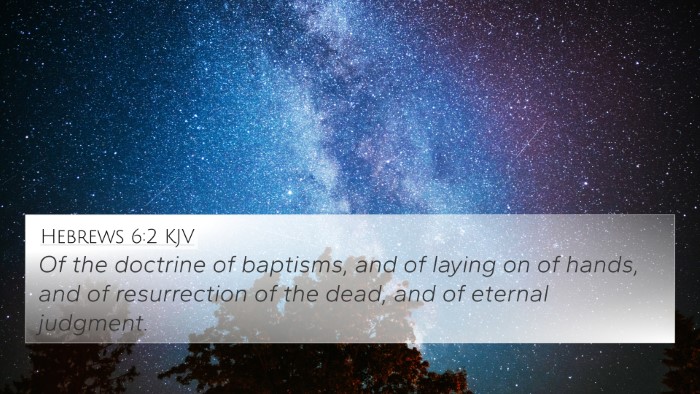Understanding 1 Timothy 5:22
1 Timothy 5:22 states, "Lay hands suddenly on no man, neither be partaker of other men's sins: keep thyself pure." This verse provides critical admonitions concerning leadership and accountability within the church.
Summary of Key Insights
This verse emphasizes the importance of discernment in the process of appointing leaders and the gravity of involvement in others' actions. According to public domain commentaries, we can extract numerous lessons from this advice:
- Carefulness in Appointments: It reflects a cautious approach to leadership, underscoring that one should not hastily ordain others without thorough consideration of their character and commitment (Matthew Henry).
- Personal Responsibility: Those who are in positions of influence should maintain moral integrity and personal purity, thereby avoiding complicity in the wrongdoing of others (Albert Barnes).
- Theological Accountability: The teaching illustrates the weight of communal and personal accountability in matters of faith and practice (Adam Clarke).
- Spiritual Discernment: This verse encourages believers to be spiritually discerning when it comes to church leadership and interpersonal relationships (Matthew Henry).
- Keeping Pure: Maintaining personal purity is essential for any believer, particularly those engaged in ministry or leadership roles (Albert Barnes).
Cross-References for 1 Timothy 5:22
To enrich the understanding of 1 Timothy 5:22, consider the following related Bible verses:
- 1 Timothy 3:10: "And let these also first be proved; then let them use the office of a deacon, being found blameless."
- James 3:1: "My brethren, be not many masters, knowing that we shall receive the greater condemnation."
- Luke 16:10: "He that is faithful in that which is least is faithful also in much: and he that is unjust in the least is unjust also in much."
- 1 Peter 5:2: "Feed the flock of God which is among you, taking the oversight thereof, not by constraint, but willingly; not for filthy lucre, but of a ready mind."
- Titus 1:7: "For a bishop must be blameless, as the steward of God; not self-willed, not soon angry, not given to wine, no striker, not given to filthy lucre."
- Proverbs 22:24-25: "Make no friendship with an angry man; and with a furious man thou shalt not go: Lest thou learn his ways, and get a snare to thy soul."
- Galatians 6:1: "Brethren, if a man be overtaken in a fault, ye which are spiritual, restore such an one in the spirit of meekness; considering thyself, lest thou also be tempted."
Connections between Bible Verses
The importance of cross-referencing Bible verses enhances the understanding of 1 Timothy 5:22. Here are some thematic connections and insights:
- Leadership and Accountability: The cross-references outline the qualifications for leadership, emphasizing the necessity of spiritual integrity and moral uprightness.
- Personal Purity: Several passages address the importance of individual holiness and responsibility, reinforcing that leaders must exemplify good behavior.
- Discernment in Relationships: Verses such as Proverbs 22:24-25 caution against becoming entangled with those who exhibit negative behaviors, echoing the same warning as in 1 Timothy 5:22.
Thematic Bible Verse Connections
Understanding how 1 Timothy 5:22 is interwoven with other scriptures can deepen your study. Here are some methods to approach this:
- Bible Concordance: Utilize tools for Bible cross-referencing to explore related themes and verses systematically.
- Cross-Reference Bible Study: Engage in methods that promote the exploration of similarities and connections within the texts.
- Comparative Study of Pauline Epistles: Analyze the teachings of Paul alongside Timothy's letters to uncover coherent principles of leadership.
Conclusion
In summary, 1 Timothy 5:22 serves as a crucial directive in guiding the church on matters of leadership, accountability, and personal integrity. Through cross-referencing, one can identify deeper connections between scriptures that further illuminate this verse's meaning. Engaging in thorough biblical study with the aid of cross-referencing tools helps understand the text in a holistic manner, fostering spiritual growth and sound church practices.


















